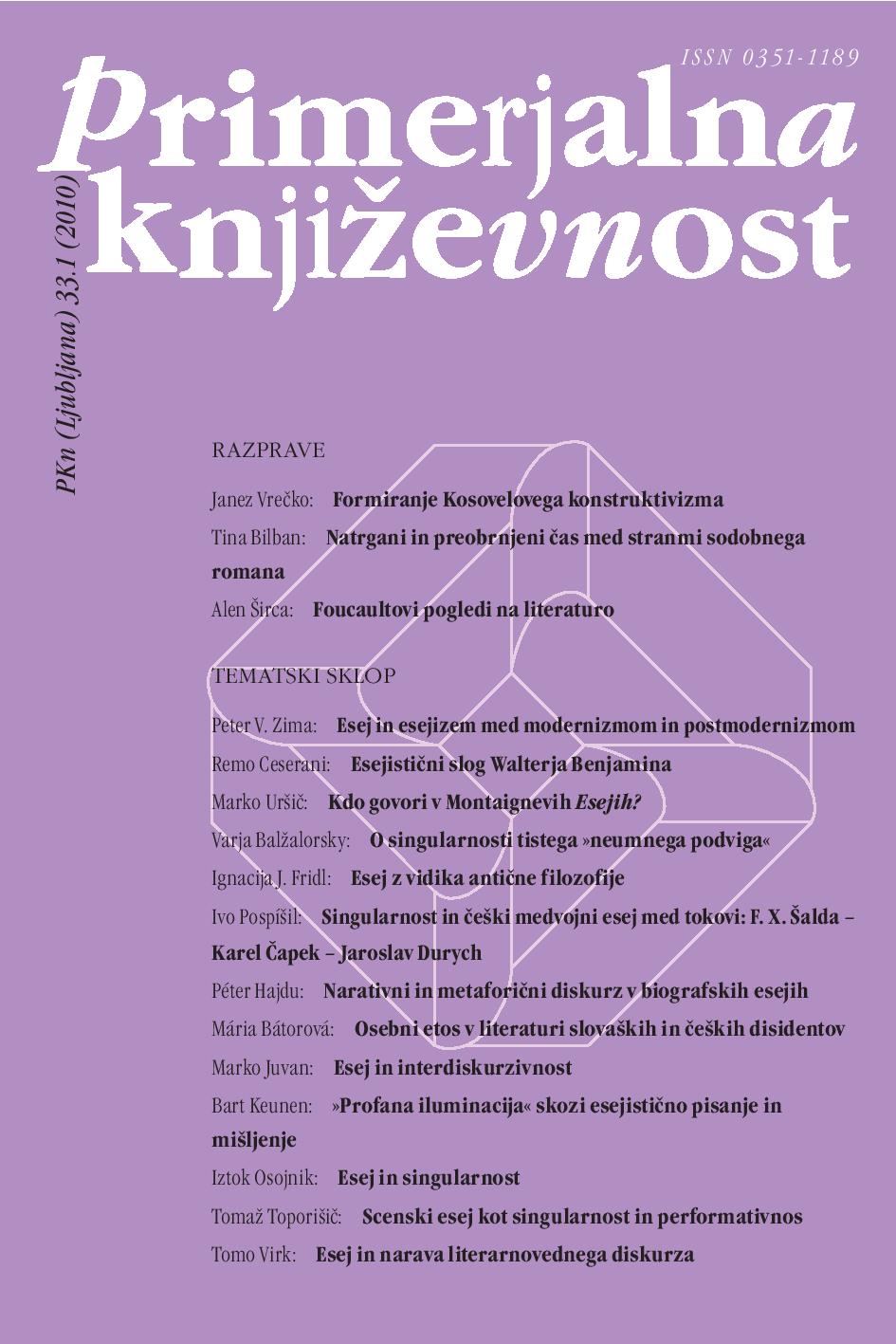The Essay from the Perspective of Ancient Philosophy
Keywords:
literature and philosophy, ancient philosophy, essay, Plato, Montaigne, Michel de, self, subjectAbstract
The essay is one of those literary genres that seem to lack a clear-cut historical determination. This article proposes a shift in the understanding and explanation of the form of the essay, moving away from the accepted historical perspective on the essay regarding its origin in Montaigne and its development up to the present. – Montaigne succeeded in providing a remarkable general starting point for his treatise on the essay, which is a reflection on the Self. The contemporary frame of mind sees reflection, at least from the Renaissance onward, as directed towards the centralization of the Self as the subject. The Self becomes the center of the world, looking over the walls at what lies beyond its experience. It is from this perspective that the Self looks at the other, at what is external, at the beyond, which is expected to reduce its sensual pleasure, emotional experience, and mental freedom. – If one interprets Montaigne’s idea and Renaissance thought in general from the reverse perspective (i.e., that of the Ancient Greek conception of the human being, especially that inherited from Socrates via Plato), one can clearly assume a different starting point for Montaigne’s understanding of the essay as the reflection of the Self. In his Essays, Montaigne sought to determine the measure and limit of his own existence through reflection on broader existential, social, and cultural issues of the world (as the titles of his essays clearly show). – Socrates identified himself with the thought “I know nothing except the fact of my ignorance”, and so he was the first to stress the importance of self-limitation of the individual. The same is true of Plato. He never evaluated his philosophy as prima philosophia. On the contrary, he reconsidered his views throughout his dialogues. It is only through the ultimate self-limitation of the Self and through listening to the language of the Other that we can gain insight into the openness of the human being between Me and You, between the particular and the general. – The essay, which has its origin in the ancient understanding of the reflection of the Self as the process of self-limitation, is not “just written literature”, but must also be “lived literature” because reflecting on matters of the world unconditionally determines the limit and measure of the one writing it. The essay is therefore not some new, historically conditioned mode of thought, but a way of life. With its open structure (today usually referred to as openness or unaccomplishment), it retains a living reflection on human ontological openness at the literary and ontological level. It is more than the only genre that expresses the openness of entities. The very process of learning about the openness of entities initiates its actualization, in which philosophy and art are no longer two separate phenomena, but speak one and the same language of the Muses: that of wisdom.References
Lukács, György. »Über Wesen und Form des Essays.« Deutsche Essay. Prosa aus zwei Jahrhunderten in 6 Bänden. Zv. 1. Essays avant la lettre. Ur. Ludwig Rohner. München: DTV, 1972. 27–47.
Montaigne, Michel de. Les Essais I–IV. Pariz: Flammarion, 19–.
Platonis Opera. Recognoverunt brevique adnotatione critica instrvxerunt E. A. Duke, W. F. Hicken, W. S. M. Nicoll, D. B. Robinson, J. C. G. Strachan. Tomus I. Tetralogias I–II continens insunt Euthyphro, Apologia, Crito, Phaedo, Cratylus, Theatetus, Sophista, Politicus. (Scriptorum classicorum bibliotheca Oxoniensis.) Oxford: Oxford UP, 1995.
Platonis Opera. Recognovit brevique adnotatione critica instrvxit Ioannes Burnet. Tomus II–V. (Scriptorum classicorum bibliotheca Oxoniensis.) Tomus II: Tetralogia III (Parmenides, Philebvs, Symposivm, Phaedrvs), Tetralogia IV (Alcibiades I, Alcibiades II, Hipparchvs, Amatores). Oxford: Oxford UP, 1901. Tomus III: Tetralogia V (Theages, Charmides, Laches, Lysis), Tetralogia VI (Evthydemvs, Protagoras, Gorgias, Meno), Tetralogia VII (Hippias maior, Hippias minor, Io, Menexenvs), Oxford: Oxford UP, 1903. Tomus IV: Tetralogia VIII (Clitopho, Respvblica, Timaevs, Critias), Oxford: Oxford UP, 1902. Tomus V: Tetralogia IX (Minos, Leges, Epinomis, Epistvlae), Definitiones et Spvria. Oxford: Oxford UP, 1907.
Platon. Zbrana dela I-II. Prev. Gorazd Kocijančič. Celje: Mohorjeva družba, 2004.
Poniž, Denis. Esej. Ljubljana: Državna založba Slovenije, 1989. (Literarni leksikon 33).


